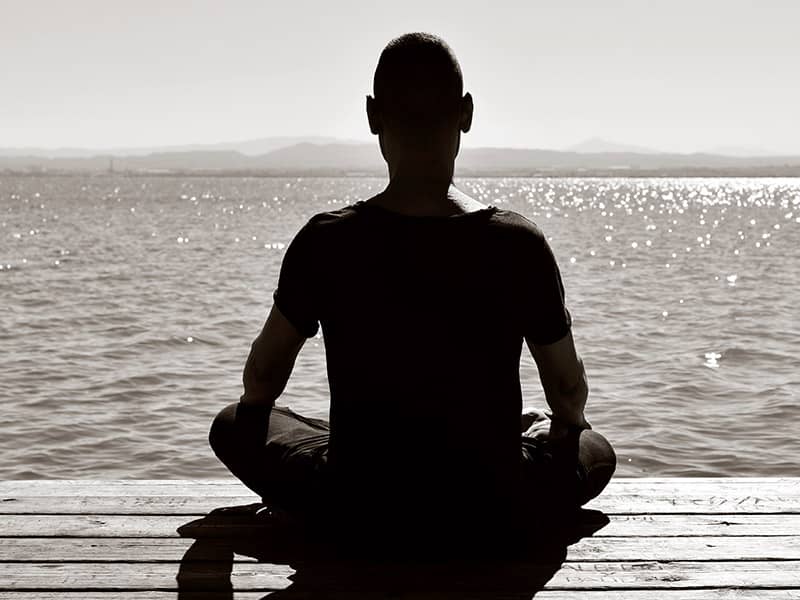
A busy mind can leave you uncomfortable, anxious and fearful. Yet, it’s hard to let go. Surrendering is one of the first steps to calming our minds. When we do this, we are breathing in positivity and breathing out negativity. One of the first steps is relinquishing control and releasing all your pain, worries and frustrations. This may not be the easiest thing to do but it’s an incredible first step. Here are four relaxation techniques to calm your busy mind.
Guided Meditation
Guided meditation can be a powerful tool to calm your mind and elicit change your life, particularly because of the way guided meditation works. Guided meditation is a process where one or more individuals is guided by a trained practitioner, teacher or narrator through meditation in an effort to relax your body and mind. During this process, your brain begins to lose distinction between imagination and reality; you feel like you’re having a real experience, even though you’re being guided through an imagined event. Through this you can find a wonderful sense of peace. The great part about this form of mediation is the ability to relax and let go.
One of the most popular guided meditations is offered through author and public speaker, Deepak Chopra. Many of his guided instruction begin with very simple breathing exercises, and the mantra – “so-hum” which is supposed to be the natural sound of the breath. As the mantra is repeated, people begin to find their center, and place of peace. In terms of making a distinction between regular meditation and guided mediation, Chopra says “Meditation can remove stress and replace it with a dose of inner peace. It’s one of the best tools we have to balance our emotions, deal with physical and psychological distress, and promote the peace of the present moment…” This practice offers a coach or guide so that you have a better sense of focus when we enter a meditative state and eliminate stress from your space. There are a number of resources you can find online to begin the guided meditation process. No matter what resource you use, you can release your fears and worries when you’re comfortable letting go, and being coached through the process. In this practice, you will find peace.
Let Go of Mental Distractions
Your mind is your enemy when you have anxiety. If you can make it harder for your mind to focus on things that could cause fear, you’ll be less able to trigger symptoms that cause the feelings of anxiety. Distract yourself all day with activities you enjoy, phone calls, positive music, comedy on television and other things that don’t cause anxiety but still distract your mind. One really effective activity is walking. Walking around helps with blood glow and provides you with visual and mental stimulation. It also reduces some of the adrenaline in your bloodstream which is important for keeping your anxiety away. Another effective activity is writing out your thoughts. Your mind has a tendency to focus on thoughts when you have them because it’s trying to get you to pay attention to them. But the mind also relaxes when it knows you’ve already recorded those thoughts.
Challenge Your Anxiety Weekly
Do one thing to challenge your fear at least once a week. This may be something you find scary but will push you out of your comfort zone. While it’s easy to live in your comfort zone, it’s not the best way to live, especially when you’re trapped in your own fear. Pinpoint the fear that’s plaguing you the most – about your body, finances, love life, career, dreams or yourself – and hold it up to the light out your awareness. Then, release it. Not doing the things that frighten you will increase the likelihood that your fears will become bigger – and take over your life. It can even be something small you choose to do, but do something daily that really challenges you to step outside of your norm. When you form the habit of doing something daily that scares you, your courage will begin to grow little by little. After some time, the barriers that once were holding you back vanish and your potential will grow tremendously.
Yoga
Yoga is a spiritual practice that has healing powers. Many who have practiced yoga regularly have had life-changing experiences, as it’s offered them relief from physical and emotional ailments that they had trouble combating through other methods. Much of yoga has to do with stretching muscles, building and strengthening through a series of postures and poses coordinated with deep breathing. The benefits include increased flexibility, improved muscle tone, calmness and lower stress. To many people, including Christians the practice has many positive aspects. We know from scripture that God made our bodies and charged us with taking good care of them. Mindfulness in yoga is defined as focusing one’s awareness on the present moment. In other words, it’s paying attention to what’s around you without getting hooked on the past or worrying about the future.
It’s important that you understand that fear is closed energy, and referred to as inverted faith. It shows up when we lose sight of our outward faith, and have an occurring about the way our life is unfolding. Worry, by definition gives way to anxiety or unease, allowing one’s mind to dwell on difficulty or troubles. When we let go of this energy in our lives, we will end up in a place of peace. Instead of focusing on your fears and worries, focus on the presence of everything around you and how insignificant our problems are when it comes to the grand scheme. We can find peace when we take out some time to focus on our inner-calm.

